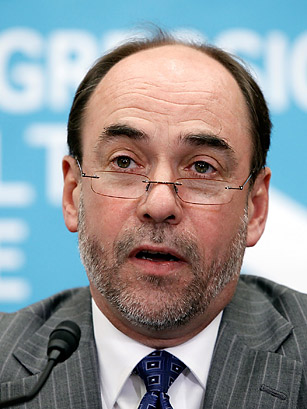
The debt-ceiling debate is now behind America — at least temporarily. But the real threat (an explosion of debt) and the real work (entitlement reform) remain.
A river of red ink emanates from the U.S.'s social-safety-net entitlement programs. Social Security is running a cash-flow deficit of $49 billion that will explode to $211 billion annually in 10 years. Medicare's hospital program (Part A) has an annual cash-flow deficit of $66 billion, while its doctor program (Part B) and drug program (Part D) cost $216 billion more than is paid in premiums. Medicaid has no dedicated federal funding. In effect, each year our children are ponying up $405 billion in federal-deficit-financed costs. Altogether health care entitlements will combine to form a crushing annual burden of $1.4 trillion by the end of the decade. The upshot is that these crucial safety-net programs will implode without reforms. Liberals tout their defense of this status quo, when in fact business as usual is a callous political calculation that cruelly abandons future seniors and poor Americans without a durable safety net.
The river of entitlement red ink courses through a broken budgetary landscape. America is borrowing $58,000 every second — more than the median income of its households — and its gross debt already exceeds the level (90% of gross domestic product) that has historically been seen as toying with danger. Even worse, the federal debt promises to explode in the next decade, which will surely result in a debt crisis like Greece's. Erskine Bowles, co-chair of the President's fiscal-reform commission, has called it the "most predictable crisis in history."
When the crisis inevitably arises, the painful memories of 2008 — panic, no credit, monthly job losses in the hundreds of thousands, Main Street businesses shuttering their windows and closing their doors, highly qualified college graduates despairing of ever finding real work — will seem quaint and mild by comparison.
Now the focus should shift to solving the real problem of moving to a durable, fiscally realistic social safety net that lifts the threat of a crushing recession from American workers. Some have argued that it is wrong to introduce such a debate during a presidential-election season. Nonsense. Nothing is more important than solving this problem. Nothing goes more to the heart of shaping America's future. Nothing is more meriting of a spirited public debate than the nature of the needed reforms.
It's time to get to work.
Douglas Holtz-Eakin is the president of the right-leaning think tank the American Action Forum. He was John McCain's chief economic-policy adviser during the 2008 presidential campaign.